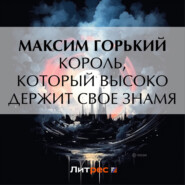По всем вопросам обращайтесь на: info@litportal.ru
(©) 2003-2024.
✖
The Man Who Was Afraid
Настройки чтения
Размер шрифта
Высота строк
Поля
“I told her, ‘Oh, you! why did you make sport of me?’” he said angrily and with reproach.
And Luba, her cheeks aflame with animation, spurred him on, nodding her head approvingly:
“That’s it! That’s good! Well, and she?”
“She was silent!” said Foma, sadly, with a shrug of the shoulders. “That is, she said different things; but what’s the use?”
He waved his hand and became silent. Luba, playing with her braid, was also silent. The samovar had already become cold. And the dimness in the room was growing thicker and thicker, outside the window it was heavy with darkness, and the black branches of the linden-trees were shaking pensively.
“You might light the lamp,” Foma went on.
“How unhappy we both are,” said Luba, with a sigh.
Foma did not like this.
“I am not unhappy,” he objected in a firm voice. “I am simply – not yet accustomed to life.”
“He who knows not what he is going to do tomorrow, is unhappy,” said Luba, sadly. “I do not know it, neither do you. Whither go? Yet go we must, Why is it that my heart is never at ease? Some kind of a longing is always quivering within it.”
“It is the same with me,” said Foma. “I start to reflect, but on what? I cannot make it clear to myself. There is also a painful gnawing in my heart. Eh! But I must go up to the club.”
“Don’t go away,” Luba entreated.
“I must. Somebody is waiting there for me. I am going. Goodbye!”
“Till we meet again!” She held out her hand to him and sadly looked into his eyes.
“Will you go to sleep now?” asked Foma, firmly shaking her hand.
“I’ll read a little.”
“You’re to your books as the drunkard to his whisky,” said the youth, with pity.
“What is there that is better?”
Walking along the street he looked at the windows of the house and in one of them he noticed Luba’s face. It was just as vague as everything that the girl told him, even as vague as her longings. Foma nodded his head toward her and with a consciousness of his superiority over her, thought:
“She has also lost her way, like the other one.”
At this recollection he shook his head, as though he wanted to frighten away the thought of Medinskaya, and quickened his steps.
Night was coming on, and the air was fresh. A cold, invigorating wind was violently raging in the street, driving the dust along the sidewalks and throwing it into the faces of the passers-by. It was dark, and people were hastily striding along in the darkness. Foma wrinkled his face, for the dust filled his eyes, and thought:
“If it is a woman I meet now – then it will mean that Sophya Pavlovna will receive me in a friendly way, as before. I am going to see her tomorrow. And if it is a man – I won’t go tomorrow, I’ll wait.”
But it was a dog that came to meet him, and this irritated Foma to such an extent that he felt like striking him with his cane.
In the refreshment-room of the club, Foma was met by the jovial Ookhtishchev. He stood at the door, and chatted with a certain stout, whiskered man; but, noticing Gordyeeff, he came forward to meet him, saying, with a smile:
“How do you do, modest millionaire!” Foma rather liked him for his jolly mood, and was always pleased to meet him.
Firmly and kind-heartedly shaking Ookhtishchev’s hand, Foma asked him:
“And what makes you think that I am modest?”
“What a question! A man, who lives like a hermit, who neither drinks, nor plays, nor likes any women. By the way, do you know, Foma Ignatyevich, that peerless patroness of ours is going abroad tomorrow for the whole summer?”
“Sophya Pavlovna?” asked Foma, slowly. “Of course! The sun of my life is setting. And, perhaps, of yours as well?”
Ookhtishchev made a comical, sly grimace and looked into Foma’s face.
And Foma stood before him, feeling that his head was lowering on his breast, and that he was unable to hinder it.
“Yes, the radiant Aurora.”
“Is Medinskaya going away?” a deep bass voice asked. “That’s fine! I am glad.”
“May I know why?” exclaimed Ookhtishchev. Foma smiled sheepishly and stared in confusion at the whiskered man, Ookhtishchev’s interlocutor.
That man was stroking his moustache with an air of importance, and deep, heavy, repulsive words fell from his lips on Foma’s ears.
“Because, you see, there will be one co-cot-te less in town.”
“Shame, Martin Nikitich!” said Ookhtishchev, reproachfully, knitting his brow.
“How do you know that she is a coquette?” asked Foma, sternly, coming closer to the whiskered man. The man measured him with a scornful look, turned aside and moving his thigh, drawled out:
“I didn’t say – coquette.”
“Martin Nikitich, you mustn’t speak that way about a woman who – ” began Ookhtishchev in a convincing tone, but Foma interrupted him:
“Excuse me, just a moment! I wish to ask the gentleman, what is the meaning of the word he said?”
And as he articulated this firmly and calmly, Foma thrust his hands deep into his trousers-pockets, threw his chest forward, which at once gave his figure an attitude of defiance. The whiskered gentleman again eyed Foma with a sarcastic smile.
“Gentlemen!” exclaimed Ookhtishchev, softly.
“I said, co-cot-te,” pronounced the whiskered man, moving his lips as if he tasted the word. “And if you don’t understand it, I can explain it to you.”
“You had better explain it,” said Foma, with a deep sigh, not lifting his eyes off the man.
Ookhtishchev clasped his hands and rushed aside.
“A cocotte, if you want to know it, is a prostitute,” said the whiskered man in a low voice, moving his big, fat face closer to Foma.
Foma gave a soft growl and, before the whiskered man had time to move away, he clutched with his right hand his curly, grayish hair. With a convulsive movement of the hand, Foma began to shake the man’s head and his big, solid body; lifting up his left hand, he spoke in a dull voice, keeping time to the punishment:
“Don’t abuse a person – in his absence. Abuse him – right in his face – straight in his eyes.”
And Luba, her cheeks aflame with animation, spurred him on, nodding her head approvingly:
“That’s it! That’s good! Well, and she?”
“She was silent!” said Foma, sadly, with a shrug of the shoulders. “That is, she said different things; but what’s the use?”
He waved his hand and became silent. Luba, playing with her braid, was also silent. The samovar had already become cold. And the dimness in the room was growing thicker and thicker, outside the window it was heavy with darkness, and the black branches of the linden-trees were shaking pensively.
“You might light the lamp,” Foma went on.
“How unhappy we both are,” said Luba, with a sigh.
Foma did not like this.
“I am not unhappy,” he objected in a firm voice. “I am simply – not yet accustomed to life.”
“He who knows not what he is going to do tomorrow, is unhappy,” said Luba, sadly. “I do not know it, neither do you. Whither go? Yet go we must, Why is it that my heart is never at ease? Some kind of a longing is always quivering within it.”
“It is the same with me,” said Foma. “I start to reflect, but on what? I cannot make it clear to myself. There is also a painful gnawing in my heart. Eh! But I must go up to the club.”
“Don’t go away,” Luba entreated.
“I must. Somebody is waiting there for me. I am going. Goodbye!”
“Till we meet again!” She held out her hand to him and sadly looked into his eyes.
“Will you go to sleep now?” asked Foma, firmly shaking her hand.
“I’ll read a little.”
“You’re to your books as the drunkard to his whisky,” said the youth, with pity.
“What is there that is better?”
Walking along the street he looked at the windows of the house and in one of them he noticed Luba’s face. It was just as vague as everything that the girl told him, even as vague as her longings. Foma nodded his head toward her and with a consciousness of his superiority over her, thought:
“She has also lost her way, like the other one.”
At this recollection he shook his head, as though he wanted to frighten away the thought of Medinskaya, and quickened his steps.
Night was coming on, and the air was fresh. A cold, invigorating wind was violently raging in the street, driving the dust along the sidewalks and throwing it into the faces of the passers-by. It was dark, and people were hastily striding along in the darkness. Foma wrinkled his face, for the dust filled his eyes, and thought:
“If it is a woman I meet now – then it will mean that Sophya Pavlovna will receive me in a friendly way, as before. I am going to see her tomorrow. And if it is a man – I won’t go tomorrow, I’ll wait.”
But it was a dog that came to meet him, and this irritated Foma to such an extent that he felt like striking him with his cane.
In the refreshment-room of the club, Foma was met by the jovial Ookhtishchev. He stood at the door, and chatted with a certain stout, whiskered man; but, noticing Gordyeeff, he came forward to meet him, saying, with a smile:
“How do you do, modest millionaire!” Foma rather liked him for his jolly mood, and was always pleased to meet him.
Firmly and kind-heartedly shaking Ookhtishchev’s hand, Foma asked him:
“And what makes you think that I am modest?”
“What a question! A man, who lives like a hermit, who neither drinks, nor plays, nor likes any women. By the way, do you know, Foma Ignatyevich, that peerless patroness of ours is going abroad tomorrow for the whole summer?”
“Sophya Pavlovna?” asked Foma, slowly. “Of course! The sun of my life is setting. And, perhaps, of yours as well?”
Ookhtishchev made a comical, sly grimace and looked into Foma’s face.
And Foma stood before him, feeling that his head was lowering on his breast, and that he was unable to hinder it.
“Yes, the radiant Aurora.”
“Is Medinskaya going away?” a deep bass voice asked. “That’s fine! I am glad.”
“May I know why?” exclaimed Ookhtishchev. Foma smiled sheepishly and stared in confusion at the whiskered man, Ookhtishchev’s interlocutor.
That man was stroking his moustache with an air of importance, and deep, heavy, repulsive words fell from his lips on Foma’s ears.
“Because, you see, there will be one co-cot-te less in town.”
“Shame, Martin Nikitich!” said Ookhtishchev, reproachfully, knitting his brow.
“How do you know that she is a coquette?” asked Foma, sternly, coming closer to the whiskered man. The man measured him with a scornful look, turned aside and moving his thigh, drawled out:
“I didn’t say – coquette.”
“Martin Nikitich, you mustn’t speak that way about a woman who – ” began Ookhtishchev in a convincing tone, but Foma interrupted him:
“Excuse me, just a moment! I wish to ask the gentleman, what is the meaning of the word he said?”
And as he articulated this firmly and calmly, Foma thrust his hands deep into his trousers-pockets, threw his chest forward, which at once gave his figure an attitude of defiance. The whiskered gentleman again eyed Foma with a sarcastic smile.
“Gentlemen!” exclaimed Ookhtishchev, softly.
“I said, co-cot-te,” pronounced the whiskered man, moving his lips as if he tasted the word. “And if you don’t understand it, I can explain it to you.”
“You had better explain it,” said Foma, with a deep sigh, not lifting his eyes off the man.
Ookhtishchev clasped his hands and rushed aside.
“A cocotte, if you want to know it, is a prostitute,” said the whiskered man in a low voice, moving his big, fat face closer to Foma.
Foma gave a soft growl and, before the whiskered man had time to move away, he clutched with his right hand his curly, grayish hair. With a convulsive movement of the hand, Foma began to shake the man’s head and his big, solid body; lifting up his left hand, he spoke in a dull voice, keeping time to the punishment:
“Don’t abuse a person – in his absence. Abuse him – right in his face – straight in his eyes.”

















